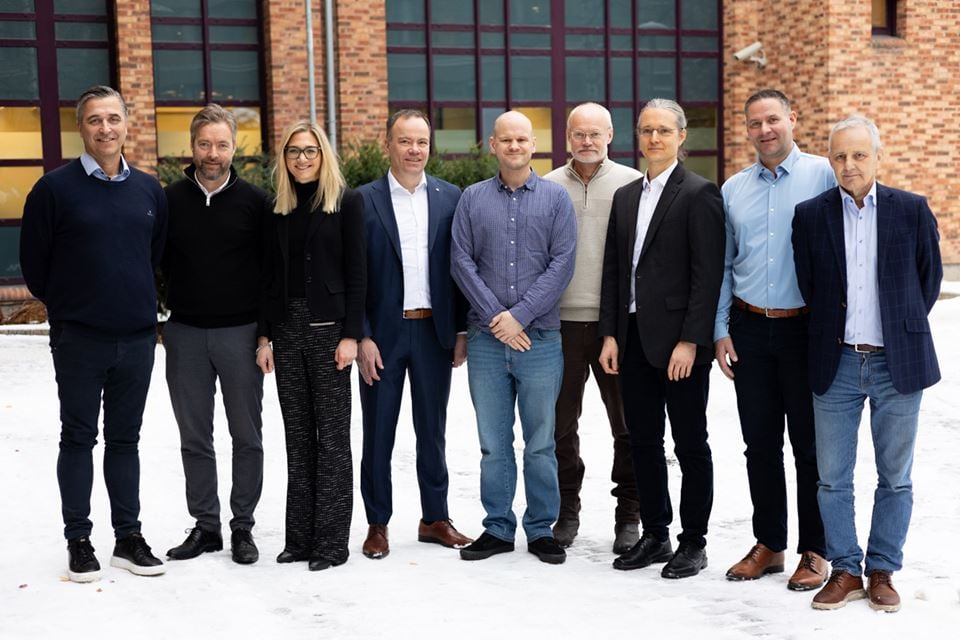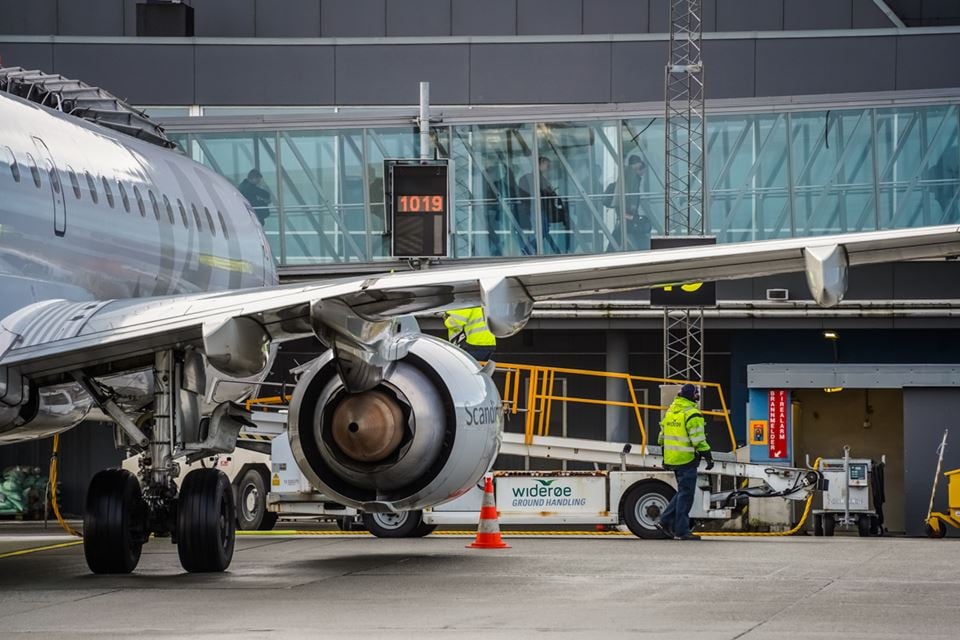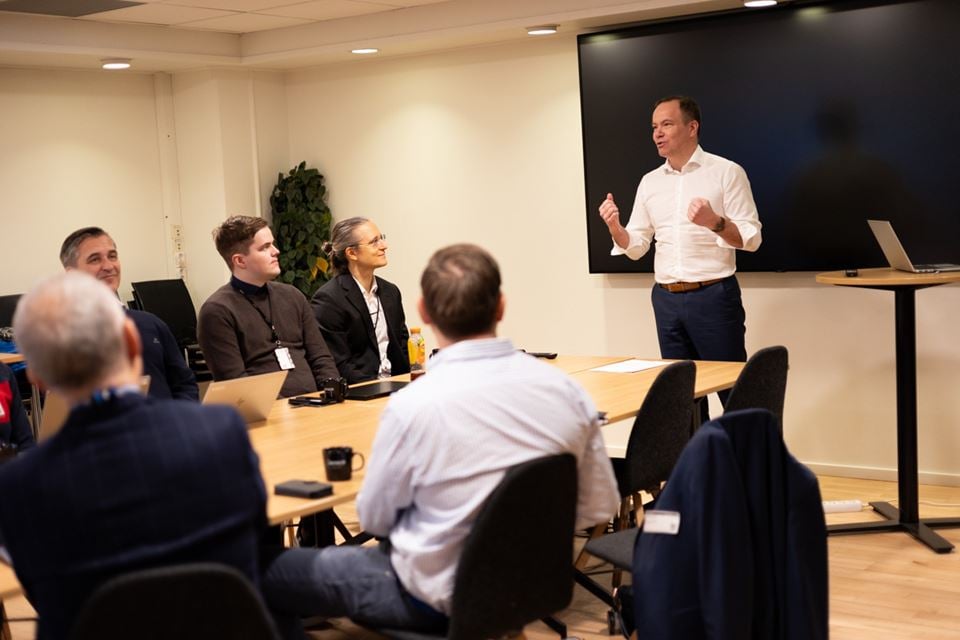Tomas Norvoll, State Secretary in the Ministry of Digitization and Administration, was on his first official mission and got to see a review of the FLAIT project.
Photo: Mari Aftret Mørtvedt
Published 14. december 2023 on https://www.sintef.no
Using artificial intelligence (AI), the FLAIT project will find and report errors in procedures when planes are emptied and made ready for the next journey. – This is “spot on” use of AI to develop solutions for a safer society, says State Secretary Norvoll.
When an aircraft parks at an airport, a number of procedures are initiated to empty the aircraft and prepare it for its next journey. The area where this happens is called the APRON or staging area, and is the busiest place at an airport. Annually, 243,000 people are injured in the APRON area at airports, which is therefore referred to as the greatest risk in aviation today.
– One of the challenges is that incidents are not always reported, and therefore you don’t learn from them either. In FLAIT , the aim is to create an AI-based digital assistant for the procedures to be followed when an aircraft is parked and made ready for the next trip, says Aksel Transeth, project manager for FLAIT.
First assignment for new State Secretary
This week he welcomed Tomas Norvoll, State Secretary in the Ministry of Digitalization and Administration, to his first official assignment in his new role, where he received a presentation of FLAIT.
– AI is going to change society, and it is up to us to turn this into something positive, said Norvoll.
He said that the government is now keen to support projects that connect clever minds in research with authorities and industry, in order to develop solutions that we can benefit from in the future.
– This project appears incredibly exciting, said the state secretary to the approximately 30 people present from various parts of the project.

Working with artificial intelligence in aviation is demanding
FLAIT started with an idea from Airside Innovation , a start-up company in technology, based in Bodø, Norway. The idea was to create an AI-based digital assistant to help ground crews who work at staging areas where aircraft come in and out, using artificial intelligence.
– The assistant will assist in continuous analysis and identification in the work with quality and safety-related incidents in the daily work. This information should help to both reduce the number of unwanted incidents, and to facilitate continuous learning, says Roar Skogstad, business developer at Airside Innovation.
In practical terms, the digital assistant will work like this:
- Cameras on the staging area collect image data that an AI model interprets to find where and what the various “objects” are on the staging area at any given time. Such objects include people, vehicles, cones, etc.
- Furthermore, it compares this with current procedures and guidelines for operations at the staging area, to find any deviations.
If the assistant finds deviations in relation to procedure, this is presented to the ground crew. In this way, they can understand what has happened, and further decide what should be reported.
In other words, if a cone is positioned incorrectly, the digital assistant will be able to recognize this, and notify the system. Ground personnel will receive this information, and they can then move it quickly to avoid damage or unforeseen incidents related to this.
– Achieving this in aviation is very demanding, but our team in this project represents the entire value chain: We have technology, research, an airport at Avinor and ground personnel at Widerøe Ground Handling, says Transeth.

Test phase under way at Trondheim Airport Værnes
As of now, five cameras have been set up at Trondheim Airport Værnes, where the project collects image data. This is used as a starting point for the development and testing work in the project.
The aim is initially to develop the necessary AI models and user interfaces. Airside Innovation will take this further into a “Stand Clear” product. The aim is for this to be able to automatically check whether there are objects where the aircraft is to park, i.e. whether the space is empty. This can complement and facilitate today’s manual processes.
– Together with Trondheim Airport Værnes, Avinor is working to make this area safer for everyone involved, and that the number of damages to aircraft and ground equipment should be reduced, explains Lars Erik Flatner, responsible for the application portfolio and business support at Avinor.
Managing Director of Airside Innovation, Håvard Breivik, is certain that there is a market for this product.
– There is extremely much happening in the field of artificial intelligence in the aviation industry today. This product is a good example where the airlines can save a lot of money, while at the same time it will make everyday life safer for ground personnel, concludes Breivik.
Facts about the FLAIT project
- Internationally, 243,000 people are injured in accidents and errors every year, in connection with planes that are parked, emptied and made ready for the next flight.
- Such incidents cost the airlines around five billion dollars, as a result of delays, personal injuries and damage to aircraft and infrastructure. This could double to 10 billion in 2035, according to IATA.
- It is a big challenge that many mistakes are not reported, which means that no one learns from the mistakes that are made.
- The goal of the FLAIT project is to develop a digital assistant, which will assist ground personnel at airports by keeping track of the work when loading and unloading aircraft, using artificial intelligence.
- FLAIT is a project owned by Airside Innovation and project managed by SINTEF, in collaboration with partners Avinor, NORCE, Widerøe Ground Handling (WGH) and Opscom Systems AS.
- FLAIT started in 2022, and has a duration of three years. The project is supported by the Norwegian Research Council and the industrial partners in the project. Bodø Municipality has given support to the project in an early phase.
Contact person

Axel Andreas Transeth
Acting research leader
+47 41 22 69 02
Aksel.A.Transeth@sintef.no

